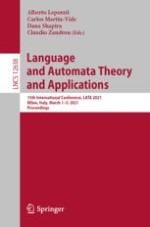2021 | OriginalPaper | Buchkapitel
Learnability and Positive Equivalence Relations
verfasst von : David Belanger, Ziyuan Gao, Sanjay Jain, Wei Li, Frank Stephan
Erschienen in: Language and Automata Theory and Applications
Aktivieren Sie unsere intelligente Suche, um passende Fachinhalte oder Patente zu finden.
Wählen Sie Textabschnitte aus um mit Künstlicher Intelligenz passenden Patente zu finden. powered by
Markieren Sie Textabschnitte, um KI-gestützt weitere passende Inhalte zu finden. powered by
